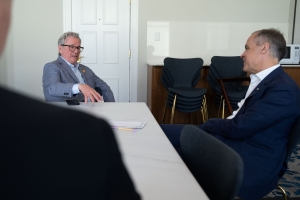Save Our Streets meets with feds about public safety
The Chamber is a founding member of the Save Our Streets coalition, which met this week with the entire BC federal Liberal caucus. SOS representatives asked what was being done to curb crime, violence and public disorder disrupting and threatening communities throughout the province.
“British Columbians are at a tipping point … and are demanding action,” SOS’s Clint Mahlman said. “People have lost faith in our justice system as a result of lack of bail efficiency and the revolving door that repeat offenders find so accommodating and that contributes to the degradation of safety on our streets.”
It’s time for all levels of government to stop blaming each other, and for senior governments to change the judicial system. The BC caucus was given a list of changes to bring back to Ottawa:
· effective bail reform targeting repeat theft and street disorder offenders
· federal dollars to provincial governments, with performance strings attached, for building out a full continuum of care for individuals suffering from addictions and mental illnesses
· a national bail repository so prosecutors can easily and quickly determine if an arrestee is out on bail with existing warrants in different jurisdictions across Canada and
· proper resourcing for the judiciary.
“Victoria council recently re-allocated $10.35m to combat these issues in Victoria and, unfortunately, many of the issues to be addressed are the realm of senior governments,” said Downtown Victoria Business Association CEO Jeff Bray, who also sits on the SOS Board.
Bray also urged the government caucus to not renew BC’s unique exemption from Health Canada’s Controlled Drugs and Substances Act. Our province is serving as guinea pig for a trial project that decriminalizes certain hard drug possession until Jan. 31, 2026. The experience here, and in Oregon where a similar pilot was attempted, has been a failure.























